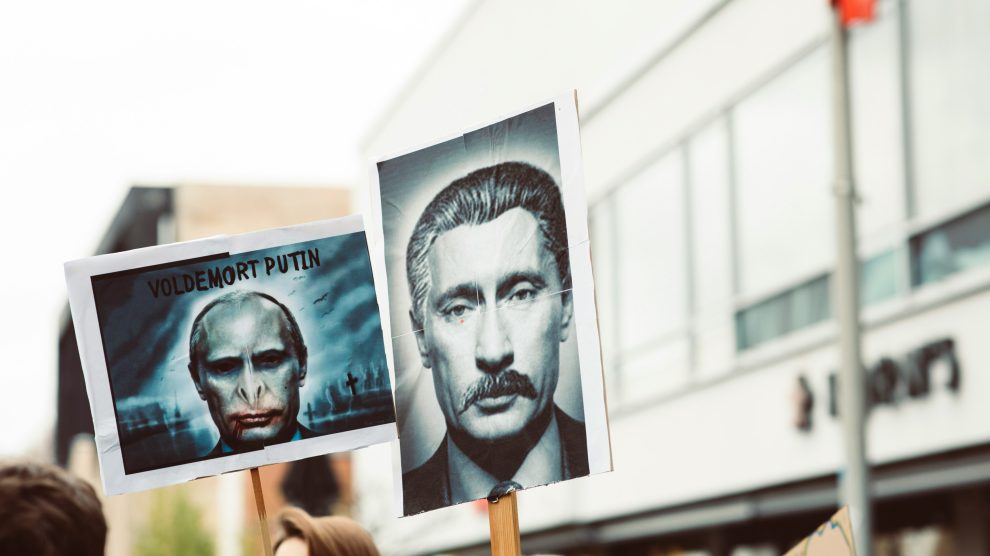Falsely blaming Ukraine and the West for the recent Moscow terrorist attack, Vladimir Putin will launch a further mobilisation of hundreds of thousands of Russians—many of whom will die in his brutal war against Ukraine.
The horrific terrorist attack in Moscow on March 22, which killed 140 Russians, is being blamed by the Kremlin on Ukrainians to launch another round of mobilisation for the war against Ukraine. Russian leaders have either ignored the ISIS claim of responsibility or—bizarrely—sought to link the terrorist group to Ukraine.
- Taking stock in Ukraine: Two years of inspiring resilience
- Reimagining Central and Eastern Europe’s future development through the Three Seas Initiative
- ‘For Ukraine to win, Ukrainian entrepreneurs must also win’
The Kremlin can only undertake further mobilisation if the Russian people continue to support the war. At first glance we would expect this to not be the case as there have been over 400,000 Russian casualties in just over two years of fighting. Footage on social media show the battlefields of eastern Ukraine littered with dead Russian soldiers.
Sadly we should accept that over two decades of Kremlin propaganda has had an impact on the Russian people. Following the most falsified election in Russian history and with Russia transformed into a totalitarian dictatorship, we are unlikely to see large numbers of Russians protesting the war in Ukraine.
Russians support the war
Russian willingness to accept very high casualties is beyond the comprehension of most of us living in the West. Many Ukrainian commanders, and experts like me, believed that once Russian casualties had reached over 150-200,000 there would be public anger and discontent by the Russian public. Some Western experts even predicted Russia would face another 1917 moment when the Tsarist imperial army refused to continue fighting and disintegrated.
Unfortunately, this has not happened. Many Russians believe it is their patriotic duty to support the war. The UK Ministry of Defence reported that February was the worst month for Russian casualties since the invasion was launched in early 2022. In February, the average daily number of Russian casualties was an astounding 983 per day.
Although casualties includes both dead and wounded, most Russian wounded are not evacuated, unlike in NATO and the Ukrainian armies, and are left to die. Besides the brutality of Russian military life, another reason for this cruel treatment is corruption; simply put, the Russian state does not pay compensation to families without proof of death which requires the soldier’s remains to be repatriated home.
With such huge numbers of Russians dying, we must accept the evidence pointing to the uncomfortable fact that Russians do support war against Ukraine, despite commentaries by some Western media and experts on Russia who claim most Russians do not support the Kremlin’s invasion of Ukraine. Mark Galeotti, a well-known expert on Russia who produces the In Moscow’s Shadow podcast, has said 25 per cent of Russians support the war, 25 per cent do not, and 50 per cent are indifferent or passive. (Arkady Ostrovsky, Economist editor for Russia and East Europe, is more optimistic, saying 15 per cent of Russians support the war).
In reality, decades of xenophobia means many Russians have bought into the Kremlin’s propaganda that the West is an existential threat to Russia. Some Russians who initially opposed the war changed their minds out of fear of the consequences of Russia’s defeat. According to the Levada Centre, 45 per cent of Russians are a ‘strong support group’ and 35 per cent are a ‘soft support group’ for the invasion. Only 20 per cent are opponents of the war.
Ineffective sanctions
The ineffectiveness of Western sanctions has meant most Russians have not experienced a change in their material circumstances. Most Russians continue to live in ‘normalcy’ because there continues to be socio-economic stability. The Russian state is maintaining high social benefits while job opportunities are abundant in the massively expanding military production needed to fuel Putin’s war of conquest.
For Russia’s ‘silent majority’ ‘life in March 2024 looks much like it did in March 2021’ and the lack of action by most Russians ‘acts as a bulwark for Russian autocracy’ by propping up Putin’s totalitarian dictatorship.
Opposition leader Alexei Navalny, who was murdered in prison last month, is a case in point. During the 2000s, he was an extreme nationalist and racist describing people in the Caucasus as cockroaches. Navalny supported the 2008 invasion of Georgia and the 2014 annexation of Crimea, agreed with Russian imperial nationalists and the Kremlin that Russians and Ukrainians are ‘one people’ and condemned autocephaly for the Orthodox Church of Ukraine.
Since his tragic murder, the Navalny team have released no statements on Russia’s invasion and war crimes because they do not grasp the inter-connection between the Russian totalitarian dictatorship inside Russia and Russian imperialist aggression against Ukraine. Ukraine’s First Lady Olena Zelensky turned down an invitation to visit Washington DC because she would have been seated next to Yulia Navalnaya, Navalny’s wife.
Indoctrination has made Russians loyal to the ideological tenets of Putin’s regime, such as the promotion of Russia as a great power, anti-Western xenophobia, wide perception Ukrainians are Russians and Ukraine is part of ‘Russia’.
Peace—on Russia’s terms
A glimmer of hope is seen in the growing number of Russians supporting peace talks to end the war. But there is a caveat. Russians supporting peace talks want Ukraine to accept the loss of its occupied territories, which Ukrainian President Volodymyr Zelensky has ruled out. Only a small number of Russians, 15 per cent, support returning the occupied territories to Ukraine.
With the large number of war crimes committed by the Russian army, Zelensky would face an uphill struggle to convince Ukrainians to back peace talks. Relations between Russians and Ukrainians have significantly deteriorated over the last decade of war and especially since the 2022 invasion. Relations are made worse by nearly two thirds of Russians not accepting responsibility for actions of the Russian army in Ukraine.
Nearly all Ukrainians, a massive 97 per cent, hold negative views of the Russian people and their leaders. With their lives in chaos and young Ukrainians drafted to fight and seeing their friends killed and wounded, it is not surprising 18-29-year-old Ukrainians are the most anti-Russian.
Putin’s totalitarian dictatorship has made it impossible for Russians to protest at home, but surprisingly the strong Russian diaspora living in democracies has also failed to build a powerful anti-Putin movement. Most of the three quarters of a million Russians who fled abroad in autumn 2022 did so not because they are anti-war but simply because they did not want to become Putin’s cannon fodder.
You will not see large protests by the 150,000 Russians living in the UK outside the Russian embassy in Britain. This is very different to the Cold War when the far smaller 30,000-strong Ukrainian diaspora in Britain regularly held protests outside the Soviet Embassy in London (I attended many of them).
We should face the uncomfortable fact that Russians will back Putin’s new round of mobilisation as they either support or are indifferent to the war against Ukraine. Falsely blaming Ukraine and the West for the Moscow attack, Putin will launch a further mobilisation of hundreds of thousands of Russians—many of whom will die in his brutal war against Ukraine.
Photo by Markus Spiske on Unsplash.
Unlike many news and information platforms, Emerging Europe is free to read, and always will be. There is no paywall here. We are independent, not affiliated with nor representing any political party or business organisation. We want the very best for emerging Europe, nothing more, nothing less. Your support will help us continue to spread the word about this amazing region.
You can contribute here. Thank you.







Add Comment